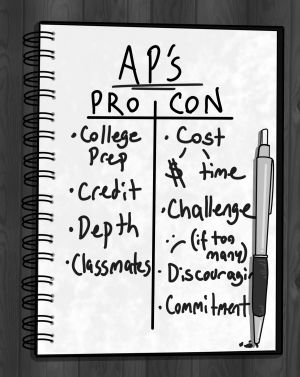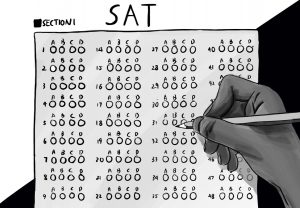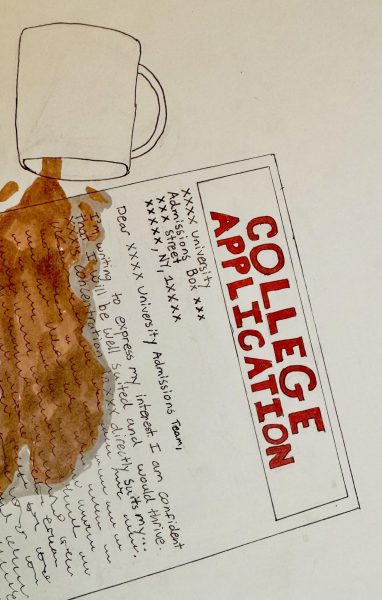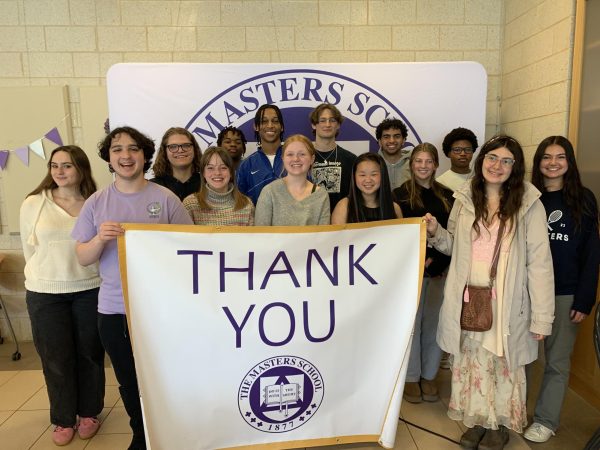Con: Choose interest over rigor and get rid of APs
The course load of AP classes often takes a toll on students and does little in increasing interest in a subject.
March 2, 2022
As high school students begin to think about the importance of their transcript, Advanced Placement [AP] usually comes to mind for most students. In simple terms, AP classes are college level courses students take in high school. These classes are known for their rigor, high demand and the possibility of college credit. The Masters School offers a variety of AP classes in all subject areas including math, science, English and history. I am a junior this year taking three AP courses and I believe that Masters should remove the option of taking AP classes.
When choosing my courses for junior year, I went back and forth on whether or not I should take APs. There were several science seminars that I was interested in, both in biology and in environmental science. This was the same case for English, where I was struggling to choose between seminars and APs. For both subjects I ultimately chose AP Biology and AP English Language for one reason: college. The biggest deciding factor was how these classes would look on my transcript. Since APs are the most rigorous classes that Masters offers, I blindly chose that option regardless of whether or not I was actually interested in these APs. Students are told that colleges tend to look at the difficulty and rigor of your classes when assessing your transcript; this information alters students’ decision when choosing courses, steering them away from meaningful learning.
There are many reasons that I think APs should not be a part of the Masters curriculum. First and foremost, it takes away from the meaningful learning experiences Masters offers. The Upper School extends the unique opportunity to choose which classes you would like to take. The options range from semester long seminars, to honors classes, to AP classes. Because the application process has told us that colleges want to see challenging and rigorous classes on high school transcripts, students tend to choose the harder classes over courses they are genuinely interested in. This begins the cycle of academic validation and competition among students.
Junior Giselle Meskin, had the opportunity to choose AP courses for English and history classes but chose American Studies, Masters’ combined-humanities course for juniors, instead.
Meskin said, “I always have to explain why I am taking American Studies and that I need to essentially prove my intelligence and prove to them that I am actually smart.”
English and history APs don’t specifically target a student’s interests, whereas seminar classes are designed around one subject matter. “Students are given a total myriad of options that they can choose from and can cater to their individual interests and what they want to talk about, what they want to learn about, and what they want to become experts on,” Meskin continued.
While students may fear that the courses they are taking won’t look as challenging if there are no APs on their transcript, this problem can be solved by removing APs entirely. This removes the pressure students face both when taking APs or when deciding courses.
Cheryl Hajjar, chairperson of the visual arts department, has been working at the Masters School for 13 years. Among the numerous art courses she teaches at Masters, two of them are APs: AP Art History and AP Art and Design. Hajjar has the ability to write her own curriculum for these AP courses but is limited to the specifications of the College Board. “Even though it is my curriculum that I write, it is a curriculum that is dictated by the requirements of the College Board,” she said.
Hajjar also worked at the Graduate School of Columbia University, where she was a part of their admissions team, “I did a survey with about 25 different college admissions officers about how important the AP’s are to them. And they said, I would say, 85% of them said that they’re not looking for AP’s; they’re looking for students to challenge themselves within their own personal best kind of milieu,” Hajjar continued. “They’re looking for students to not just challenge themselves academically but also be extremely community minded and have other interests outside of academics. That’s what they valued much more in terms of their admissions decisions.”
Hajjar has been with Masters for over a decade and has been able to see the impact of AP’s in the Masters community. She said, “In my years teaching here, the [AP] program has changed a lot and it has become a much healthier program. But I still feel like we have a dynamic enough faculty to really create challenging courses for students, that are much more student driven, and will support their learning based on their passions and combining passions.”
Many independent schools in New York have already taken the initiative to remove APs as an option, including The Dalton School located in NYC. Dalton got rid of AP classes in 2003, as critics of APs began to notice the pressure it put on students. The rigid curriculum that all APs must follow does not give teachers any flexibility to expand on certain topics or focus on topics of less relevance to the exams. The strict curriculum along with the constant assessment of performance can lead to students developing a reliance on academic validation based on how high they score on an exam.
While I understand that there are students who choose to take AP’s for the challenge they provide, Masters has done a strong job of providing courses that permit the same level of difficulty, without the AP label. Courses such as Master’s Thesis and American Studies accommodate students with a challenging class while being able to focus on certain topics. Another aspect that needs to be addressed: a multitude of colleges that Master students apply to do not actually accept the AP credit from these courses.
Many students attend private schools for a more individualized learning experience. AP’s detract from that often alluring aspect of independent high schools like Masters.
As an independent school, Masters has more flexibility with their curriculum and what courses they are able to offer. I think students should focus on taking advantage of this exclusive circumstance rather than aim to take the most challenging course possible. Masters is offering students the chance at meaningful learning and to discover passions in certain subjects, this opportunity should not be looked over because it lowers your chances of getting into a more prestigious college. These courses can still be as rigorous as AP’s but with the specialties that private schools offer.































Shammy Peterson • Jul 19, 2022 at 9:40 AM
It was nice that it was mentioned that AP classes are designed to capture the interest and what students what to talk about based on the myriad of options. My sister will surely consider this tip because she is planning to enroll her daughter in an AP class next school year. I will ask her to consider the passion for her daughter to help her to decide well.